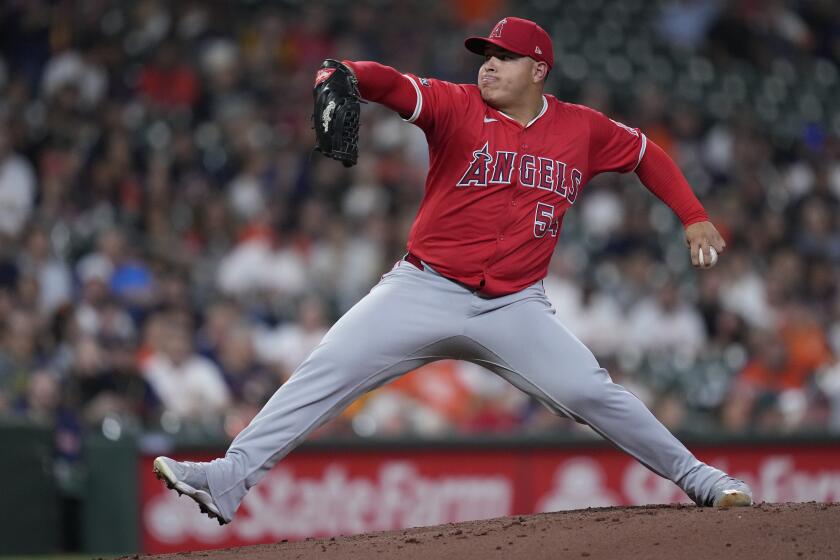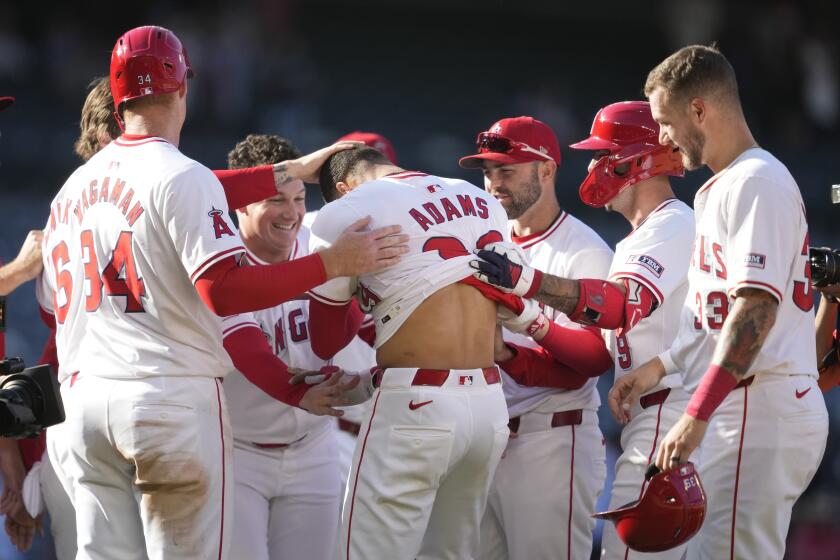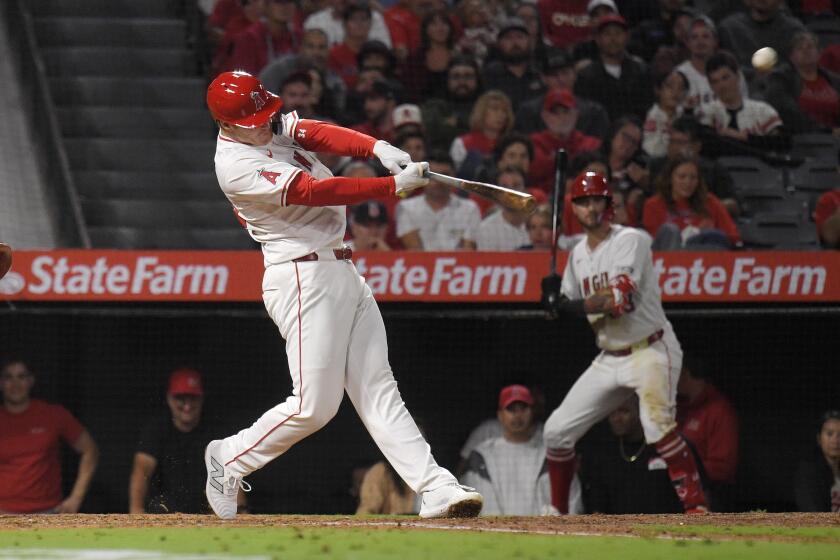Name-Game Trial to Start
To Anaheim, this is about restoring the hometown name to the hometown baseball team. To the Angels, this is about obtaining legal blessing for their business strategy.
Both sides could lose.
In an ugly chapter of what could become a nasty divorce, and in a court case that could end up in a lose-lose split decision, the city and the team go to trial today in Orange County Superior Court.
In the one year and one week since the Angels declared themselves a Los Angeles team and Anaheim sued in response, the two sides have run up more than $6 million in legal bills, all over five words in an 80-page stadium lease.
The Angels argue that a provision requiring the team name to “include the name Anaheim therein” entitles them to play as the Los Angeles Angels of Anaheim and does not compel them to promote themselves as an Anaheim team. The city rejects those claims, calls the name absurd and wants the court to order the removal of “Los Angeles.”
This is the lose-lose scenario: The jury finds that the Angels broke the lease and awards tens -- or hundreds -- of millions of dollars in damages. The judge deems a financial penalty appropriate but refuses to issue the order to drop “Los Angeles.”
If the Angels win, they remain saddled with the clumsy “of Anaheim” suffix on their name, and the city blows all its ticket revenue from three years of record attendance under owner Arte Moreno on the suit against the team.
If the city wins, Moreno could finance a damage award by cutting payroll, and fewer victories on the field could mean that attendance would drop enough to where the Angels need share no ticket revenue with Anaheim.
Or, if the city gets its name back, Moreno could decide that he cannot implement his business plan, and the only owner in club history to preside over back-to-back division championships could sell the team rather than play under a name he does not want.
The legal battle might not end when the trial does, if a losing party fights on in appeals court. And, no matter what the outcome, both sides have suggested that the Angels might abandon Anaheim in 2016, when they can opt out of their lease.
The unpredictability of a jury trial -- and the possibility of a result unfavorable to one side, or both -- often prompts parties to settle, said Sheldon Eisenberg, a Santa Monica attorney who has followed the case closely.
“In a normal business dispute, cases frequently settle at the last minute,” Eisenberg said. “In my view, the political and civic pride aspects of this make it very difficult.
“It’s an either-or situation -- it’s either going to be Los Angeles or it’s not. I think Arte would pay some money for the right to call the team whatever he wants, but would the city allow the team to be called the L.A. Angels for anything short of a mind-boggling amount of money? The dynamics of the politics make it hard to settle the case.”
As part of the 1996 lease that includes the five words at issue, the city contributed $20 million toward stadium renovations. That investment, the city argues, would not have been made without the promise that the Angels would feature the Anaheim name, providing national media exposure for the city in stories, scores and standings.
Two experts retained by the city independently valued the lost exposure at $191 million from 2005 through 2016. The Angels have challenged such claims as “speculative” and have asked that the city be barred from introducing them as evidence.
The Anaheim City Council would have to approve any settlement. Three council members, including Mayor Curt Pringle, are up for reelection this year.
“I’d think a settlement would have to be in the range of $200 million or higher to justify it to the taxpayers of Anaheim. Otherwise, they’d have a lot of explaining to do,” said Tom Daly, the former Anaheim mayor and now Orange County clerk-recorder. “If it’s $30 million, you could expect a recall.”
The two sides met with court-appointed mediators five times, without success. Pringle and Councilman Richard Chavez, who also is up for reelection this year, each declined to discuss the negotiations but said the Angels have made no offer worthy of consideration. The Angels declined to comment.
Pringle said it would be “awfully hard” to vote for any settlement that included the Los Angeles name. Chavez said he never would approve Los Angeles -- “or Oakland or Chicago,” he said.
“We’ve got a billionaire trying to push us around. It’s wrong,” Chavez said. “The people of Anaheim and the people of Orange County know we are not Los Angeles. It has nothing to do with politics. It has to do with what’s right.”
Pringle said the failure to settle does not reflect a political calculation of whether a settlement -- and a Los Angeles name -- would doom his reelection in Anaheim.
“My simple motive here is, the people of Anaheim have had something taken away,” he said. “The taxpayers have invested their money. My job is to defend them. If that’s deemed political, then yes. I’m doing exactly what I’ve been elected to do.”
And, he said, if fighting for the Anaheim name means that the Angels leave town in 10 years, so be it.
“I believe, if the name of the team stays [as Los Angeles], the Angels may very well not be here in 10 years anyway,” Pringle said. “It’s a motivation for them to look somewhere else and to move into a community more closely identified with their name.”
The name change is not about moving to Los Angeles, Moreno has said, but about persuading advertisers and broadcasters to pay more by reminding them that the Angels play in the second-largest media market in the country, part of an image makeover that he hopes will pay off within five to seven years.
The more the Angels generate in revenue, he argues, the more they can pay players, and the better the chance of fielding a perennial winner and attracting crowds that will spend money in Anaheim. City officials applaud those goals but say the lease provides flexibility for an owner to use Anaheim before or after the team nickname, not to subordinate it to the name of another city.
The Angels respond that the city should have insisted on such language in lease negotiations rather than ask the court to effectively rewrite the lease.
If the jury rules in favor of Anaheim, the city will ask Judge Peter Polos to grant a permanent injunction that would forbid the Angels from using the Los Angeles name. Polos last year refused two such requests, once when the city sought a temporary restraining order and again when the city sought a preliminary injunction. He ruled that the city had failed to prove that a financial penalty would be insufficient if the Angels had broken the lease. The city says that the virtual disappearance of Anaheim from Angel coverage over the past year justifies the injunction.
Eisenberg said it was rare for a judge to grant a permanent injunction after denying a temporary one. He added, however, that Polos had the authority to reduce or throw out a damage award if he considered the amount unsupported by law or evidence. Though the city can ask for a specific amount in damages, he said, the jury can award more or less as it sees fit.
“The size of the verdict may be leverage on the judge to grant the injunction,” Eisenberg said. “He might not think it’s reasonable to nail the team for $200 million.”
In the year since Anaheim filed suit, the city and the team have worked together to lure the World Baseball Classic to Angel Stadium. Pringle and Angel spokesman Tim Mead each said he hopes the two sides can work together again after the trial. For now, they agree on little beyond this: Pitchers and catchers report to spring training in five weeks.
Go beyond the scoreboard
Get the latest on L.A.'s teams in the daily Sports Report newsletter.
You may occasionally receive promotional content from the Los Angeles Times.




